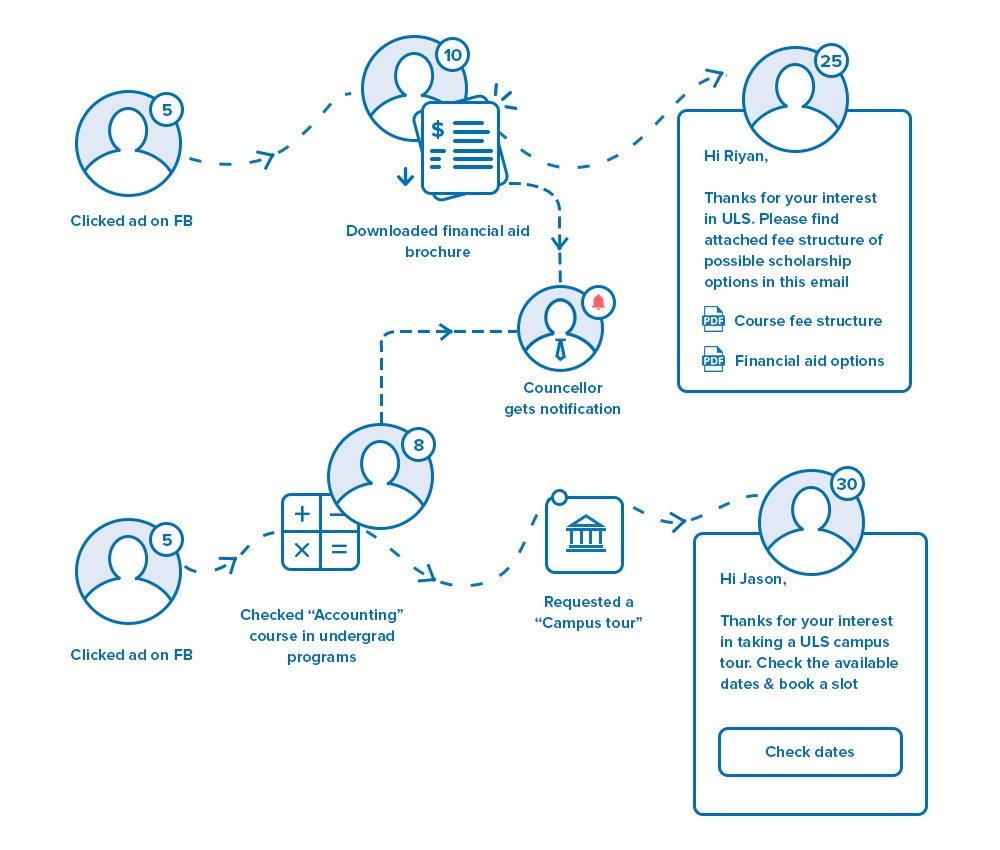The National Student Clearinghouse Research Center reported a 3.1% drop in undergraduate enrollment. Today’s students expect personalized, digitally supported educational experiences that mirror the service levels of big tech companies
Customer Relationship Management (CRM) systems are the answer to this. CRMs help institutions grow enrollment, cut costs and connect with students and alumni.
This article looks at CRMs for colleges, the benefits they bring to institutions and how they are changing student engagement, enrollment and retention.
CRM for Colleges: A New Era in Education
What is a CRM?
A Customer Relationship Management (CRM) system is a software that helps organizations manage interactions with their customers or clients in a structured, data-driven way.

A Customer Relationship Management (CRM) system when applied to education acts as a central platform to manage all interactions across the student lifecycle from recruitment to graduation and even alumni engagement.
Unlike general business CRMs, education specific CRMs like LeadSquared’s Higher Education CRM are designed to meet the needs of academic institutions.
Education CRMs do more than basic contact management, simplifying complex processes, improving communication and driving student engagement through features designed for colleges and universities:
- Application tracking: Helps colleges manage each stage of the application process, communicate with students and track progress.
- Financial aid management: Tracks scholarship eligibility, awards and fund distribution, supports financial aid administration and transparency.
- Student support services: Manages support services like academic advising, mental health resources and career support, student care.
- Career services management: Tracks internships, job placements and alumni networks, students can connect with career opportunities.
By centralizing these services, CRMs help institutions in the education sector deliver data driven experiences to modern students, simplify operations and improve overall student satisfaction.
Why CRM is important for higher education institutions
Higher enrollment rates
Institutions with a CRM benefit from optimized sales and marketing processes and data-driven recruitment strategies. By collecting and analyzing data on prospective students, CRMs allow colleges to create highly targeted recruitment campaigns and reach and engage more. This helps improve enrollment rates by-
- Improving conversion rates: CRMs help colleges connect with prospective students on a more personal level. Forrester reports that using a cloud based CRM can increase enrollments by upto 11%.
- Targeted communication: CRMs provide insights to admissions teams to send timely and relevant information to prospective students and increase engagement and interest.

As institutions compete for students in a tougher market, these features make CRMs a valuable tool to reach and convert students.
Cost savings through efficiency
CRMs not only improve recruitment outcomes but also help institutions reduce operational costs through an integrated CRM platform. According to a report by Tribal group, adopting a CRM can reduce student acquisition costs by 30%.
- Automated workflows: By creating workflows to automate tasks like follow up emails, application reminders and financial aid notifications, integrated CRM platforms reduce manual intervention, cut labor costs and free up staff time for high value interactions.

- Resource allocation: CRMs help institutions allocate recruitment resources more effectively, focus on channels and campaigns that deliver the best results.
This combination of cost savings and efficiency helps institutions get more from their recruitment budget and achieve their enrollment targets without unnecessary spend. These benefits are particularly significant in the education sector, where financial challenges are often more pronounced.
Student retention rates
Retention is a big challenge in the education sector as students expect more personalized support. A higher education CRM system helps institutions monitor student engagement, track academic progress, and implement timely interventions which all contribute to higher retention rates.
- Personalized support: Higher education CRM systems have data on each student’s journey so institutions can offer support when and where it’s needed most.
- Proactive engagement: By identifying at-risk students early, higher education CRM systems enable timely interventions, whether it’s academic advising or mental health support.
This is critical for colleges to provide a supportive environment for long-term student success.
Benefits of CRM for Higher Education
Student engagement
One of the biggest benefits of CRM in the education sector is the ability to enhance the student journey and increase student engagement through personalized communication. CRMs use data on student preferences and behavior to create meaningful and customized interactions.
- Real-time messaging: CRMs like LeadSquared have automated workflows that trigger communication based on individual student actions, e.g. visiting the institution website or attending a virtual event.
- Data driven personalization: By tracking student interests and engagement patterns CRMs allow institutions to send messages that will resonate more with each student.
- Faster response times: With automated systems CRMs reduce inquiry response times by 20% as expected by today’s students.
Salesforce Education Cloud data shows CRMs in institutions see 25% increase in engagement rates and 30% improvement in response times, creating stronger early connections that build trust and increase conversion.
Improved admissions and enrollment efficiency
The admissions process is resource heavy, institutions receive thousands of applications each cycle. CRMs integrated with student information systems help manage these volumes by automating key steps and increasing transparency so both applicants and admissions teams can see what’s happening. The education sector benefits greatly from these systems, ensuring better alignment with institutional goals and enhanced student engagement.
- Automated document collection: CRMs automate tasks like document collection and verification, reducing manual mistakes and saving time.
- Application progress updates: Prospective students get automated updates on their application status, increasing transparency and keeping them engaged through the process.
- Lead scoring for targeted recruitment: CRMs help admissions teams prioritize high potential applicants by implementing lead scoring and focus recruitment efforts on candidates who are most likely to convert.

LeadSquared CRM users see a big reduction in application processing time and a boost in application completion rates. This means admissions staff can focus on building relationships with top candidates rather than paperwork.
Data driven decision making
Data driven decision making
Data analytics is another big feature of CRMs in the education sector, allowing institutions to make data-driven decisions based on real-time information. By analyzing enrollment, engagement, and academic performance trends, institutions can refine their strategy to improve student outcomes and operational efficiency.

- Enrollment analysis: CRMs have data on application and enrollment trends so institutions can adjust their recruitment strategy to match current demand.
- Student behavior Insights: By tracking engagement, CRMs allow colleges to see where students need more support.
- Better resource allocation: Data-driven insights help institutions allocate their budgets and resources more effectively, on the areas that have the biggest impact.
Educause research shows colleges using CRM analytics see a 15% increase in retention and 20% better resource utilization, creating a more sustainable and student-centric learning environment.
Alumni relations and networking
CRMs are not just for current students; they are also key to building long term relationships with alumni. Strong alumni engagement benefits institutions through fundraising, mentorship and brand reputation and CRMs enable this engagement through:
Event management
CRMs simplify the planning and promotion of alumni events like networking gatherings, lectures and reunions which strengthen alumni connections.
Mentorship and networking programs
By tracking alumni profiles and preferences CRMs make it easier to create mentorship opportunities, connect alumni with current students to support career development.
Personalized outreach for fundraising
With detailed alumni profiles institutions can tailor their outreach to increase donation rates and build long term relationships.
Institutions with strong alumni engagement programs see higher fundraising success, CRMs help maintain active and ongoing relationships that benefit both alumni and the college. CRM systems are specifically designed to meet the needs and requirements unique to the education sector, ensuring better alignment with institutional goals and enhanced student engagement.
Best Practices While Implementing CRM for Colleges
Implementing a CRM in higher education requires planning and collaboration across departments. Here are the steps to follow to ensure a successful CRM rollout:
Needs analysis
Start by identifying the specific challenges and goals the CRM will address, align with institutional goals.
Stakeholder involvement
Involve admissions, marketing, student services and IT departments to ensure the CRM meets all departmental needs.
Training and change management
A training plan is crucial for adoption. Change management should highlight the benefits of the system and have clear communication to get user buy in.
Continuous improvement and monitoring
Regular audits and user feedback sessions to ensure the CRM continues to meet evolving needs and maximize its impact.
Implementing these best practices ensures that the CRM system is tailored to the unique requirements of the education sector.
LeadSquared provides customized onboarding and training support to help institutions migrate to their CRM smoothly, so staff are ready to use the system to support student engagement and institutional goals.
Conclusion
With declining enrollment and rising student expectations, CRMs are the solution for higher education institutions to increase engagement, streamline processes, and make data-driven decisions in the education sector.
By investing in a CRM, colleges and universities can improve their ability to attract, retain, and engage students and thrive in a competitive education landscape.
For institutions committed to delivering personalized, high-quality education, investing in a CRM like LeadSquared higher education CRM goes beyond just a technological upgrade. It’s an essential step toward ensuring long-term success and resilience in an evolving educational landscape.







